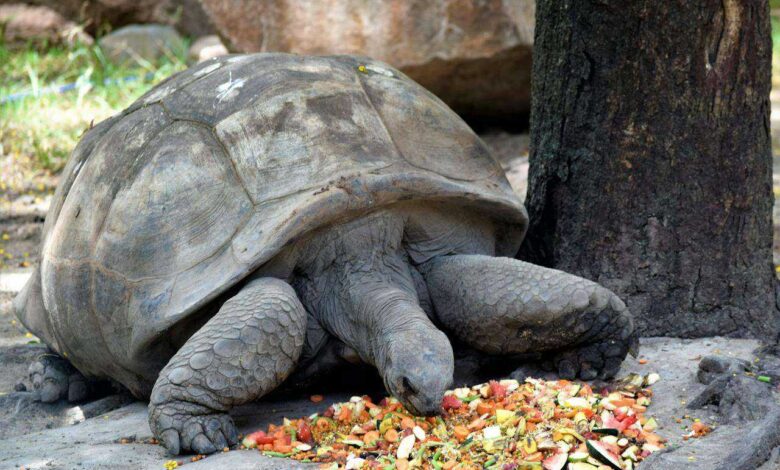
What to feed a pet turtle, welcoming pet owners to the intricate world of turtle nutrition, the introduction highlights the symbiotic relationship between diet and a turtle’s overall health. Setting the stage for an in-depth dive, the tone is warm and inviting yet underscored by the importance of responsible pet care
1. What to Feed a Pet Turtle: Species-Specific Recommendations
Best Diet for a Pet Turtle:
Delving into the fundamentals, this section emphasizes the need for a balanced diet. It details the specific requirements for omnivorous, herbivorous, and carnivorous species, establishing a foundation for tailored nutrition.
Feeding a Baby Turtle:
With a focus on the fragile stages of turtle infancy, this subheading elaborates on nutrient-dense options and proper portion control. Readers are guided through the crucial developmental phase, ensuring a healthy start for their hatchlings.
Feeding Different Turtle Species:
Species-specific recommendations offer a comprehensive guide, exploring the distinct preferences and nutritional needs of red-eared slider turtles, box turtles, and tortoises. Tailoring the diet to individual species fosters optimum health.
2. Troubleshooting Feeding Challenges: From Picky Eaters to Health Issues
Feeding a Pet Turtle that Won’t Eat:
Acknowledging a common concern among turtle owners, this section empathizes with the challenges of a reluctant eater. It provides practical strategies to entice appetite while addressing potential health issues.
Feeding a Pet Turtle with a Sensitive Stomach:
Navigating the complexities of turtle digestion, this subheading offers solutions for turtles with sensitive stomachs. It emphasizes the importance of choosing easily digestible foods and monitoring dietary triggers.
Feeding a Pet Turtle with Shell Rot:
In a compassionate tone, this section addresses the serious issue of shell rot. It not only suggests dietary adjustments to boost the immune system but also underscores the role of nutrition in the healing process.
Feeding a Pet Turtle with Metabolic Bone Disease (MBD):
Taking a proactive approach, this segment educates readers on the dietary considerations for turtles facing metabolic bone disease. The focus is on calcium and vitamin D3 supplementation to support bone health.
Feeding a Pet Turtle with Respiratory Problems:
Tackling the intricacies of respiratory issues, this part provides feeding strategies to support turtles struggling with breathing difficulties. It emphasizes the importance of easily digestible foods for respiratory wellness.
Feeding a Pet Turtle with Urinary Tract Problems:
Navigating the delicate terrain of urinary tract problems, this subheading offers dietary adjustments to alleviate issues. It promotes hydration, low-oxalate foods, and underscores the need for professional veterinary intervention.
3. Crafting a Balanced Diet: Tips and Techniques
How to Make Your Own Turtle Food:
Empowering pet owners, this segment offers a step-by-step guide to crafting homemade turtle food. It underscores the importance of variety, ensuring a well-rounded and nutritious diet tailored to individual tastes.
What Vegetables and Fruits to Feed a Pet Turtle:
In a colorful exploration of tastes, this section lists turtle-friendly vegetables and fruits. It goes beyond the basics, providing insights into the nutritional benefits of each, encouraging a diverse diet.
What Protein to Feed a Pet Turtle:
Acknowledging the pivotal role of protein, this part guides readers through suitable protein sources for turtles. From insects to lean meats, the focus is on fostering muscle development and overall vitality.
What Supplements to Feed a Pet Turtle:
Taking a deep dive into supplementation, this segment demystifies the need for specific nutrients. It provides practical guidelines on supplement types, dosages, and the crucial role they play in a turtle’s well-being.
How to Feed a Pet Turtle a Balanced Diet:
Bringing it all together, this subheading summarizes the key components of a balanced diet. It offers sample feeding schedules for different turtle species, ensuring a holistic approach to nutrition.
4. Avoiding Overfeeding and Common Feeding Problems
How to Avoid Overfeeding a Pet Turtle:
With a touch of humor, this section highlights the risks of overfeeding and offers practical tips for portion control. It encourages owners to observe natural feeding behaviors for a happy and healthy turtle.
How to Treat Common Turtle Feeding Problems:
A troubleshooting manual of sorts, this part addresses common feeding issues such as vitamin deficiencies and obesity. It provides actionable solutions, empowering pet owners to proactively manage these challenges.
How to Safely Feed Live Food to a Pet Turtle:
In a lively exploration of the carnivorous side, this segment delves into the benefits and risks of live food. It guides owners on safe choices and responsible practices, ensuring a dynamic and diverse diet.
5. Special Circumstances: Hibernating and Shedding Turtles
How to Feed a Pet Turtle that is Hibernating:
Navigating the unique nutritional needs during hibernation, this section provides guidance on adjusting a turtle’s diet. It emphasizes the importance of catering to the slowed metabolic rate during this natural process.
How to Feed a Pet Turtle that is Shedding:
With a touch of empathy, this subheading explores the impact of shedding on a turtle’s appetite. It offers practical tips for supporting turtles nutritionally during the shedding process, promoting overall well-being.
What to Feed a Pet Turtle
Summing up the intricate journey of turtle nutrition, the conclusion emphasizes the holistic approach needed for a thriving pet turtle. It encourages continuous monitoring, veterinary consultation, and responsible care as essential components of a happy and healthy turtle life.








